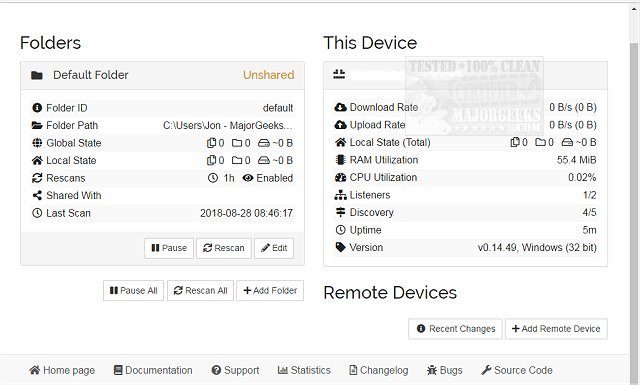Syncthing 2.0.0 has been released, enhancing its status as a portable Open Source alternative to proprietary file synchronization and cloud services. This software is designed with safety, security, and decentralization in mind, allowing users to continuously synchronize files across multiple computers with minimal interaction required. Its user-friendly browser-based GUI simplifies the configuration and monitoring of file-sharing activities.
One of Syncthing's key advantages is that it gives users complete control over their data. Users can decide where their data is stored, whether it is shared with third parties, and how it is transmitted online. Unlike many other file-sharing applications, Syncthing does not rely on third-party servers for data storage, ensuring that your information remains private. All communications are protected through TLS encryption, and each node within the network is assigned a strong cryptographic certificate for added security. Only nodes that have been explicitly permitted can connect to the user's cluster, further safeguarding against unauthorized access.
As Syncthing continues to evolve, it is likely that future updates will enhance its features and capabilities, ensuring it remains a reliable choice for users seeking secure and private file synchronization solutions. Moreover, users may benefit from community-driven support and contributions, fostering a robust ecosystem around this open-source project.
Additionally, users looking for more information on related topics might find it useful to explore guides on backing up Google Drive or reinstalling Windows 10 and 11 using cloud services, as these resources can complement the functionalities provided by Syncthing in managing and securing data
One of Syncthing's key advantages is that it gives users complete control over their data. Users can decide where their data is stored, whether it is shared with third parties, and how it is transmitted online. Unlike many other file-sharing applications, Syncthing does not rely on third-party servers for data storage, ensuring that your information remains private. All communications are protected through TLS encryption, and each node within the network is assigned a strong cryptographic certificate for added security. Only nodes that have been explicitly permitted can connect to the user's cluster, further safeguarding against unauthorized access.
As Syncthing continues to evolve, it is likely that future updates will enhance its features and capabilities, ensuring it remains a reliable choice for users seeking secure and private file synchronization solutions. Moreover, users may benefit from community-driven support and contributions, fostering a robust ecosystem around this open-source project.
Additionally, users looking for more information on related topics might find it useful to explore guides on backing up Google Drive or reinstalling Windows 10 and 11 using cloud services, as these resources can complement the functionalities provided by Syncthing in managing and securing data
Syncthing 2.0.0 released
Syncthing is a portable Open Source replacement from proprietary sync and cloud services designed to be safe, secure, and decentralized.


